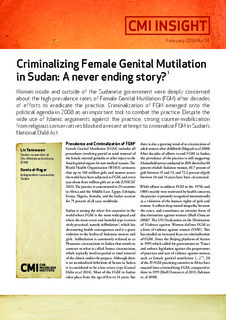| dc.contributor.author | Tønnessen, Liv | |
| dc.contributor.author | al-Nagar, Samia | |
| dc.date.accessioned | 2018-01-04T08:21:50Z | |
| dc.date.available | 2018-01-04T08:21:50Z | |
| dc.date.issued | 2016-01-01 | |
| dc.identifier | oai:www.cmi.no:5726 | |
| dc.identifier.citation | Bergen: Chr. Michelsen Institute (CMI Insight 2016 no.1) 6 p. | |
| dc.identifier.issn | 0809-6732 | |
| dc.identifier.uri | http://hdl.handle.net/11250/2475254 | |
| dc.description.abstract | Women inside and outside of the Sudanese government were deeply concerned about the high prevalence rates of Female Genital Mutilation (FGM) after decades of efforts to eradicate the practice. Criminalization of FGM emerged onto the political agenda in 2008 as an important tool to combat the practice. Despite the wide use of Islamic arguments against the practice, strong counter-mobilization from religious conservatives blocked a recent attempt to criminalize FGM in Sudan’s National Child Act. | |
| dc.language.iso | eng | |
| dc.publisher | Chr. Michelsen Institute | |
| dc.relation | CMI Insight | |
| dc.relation | 2016:1 | |
| dc.relation.ispartof | CMI Insight | |
| dc.relation.ispartofseries | CMI Insight 2016:1 | |
| dc.relation.uri | https://www.cmi.no/publications/5726-criminalizing-female-genital-mutilation-in-sudan | |
| dc.subject | Female Genital Mutilation | |
| dc.subject | Sudan | |
| dc.title | Criminalizing Female Genital Mutilation in Sudan: A never ending story? | |
| dc.type | Report | |
